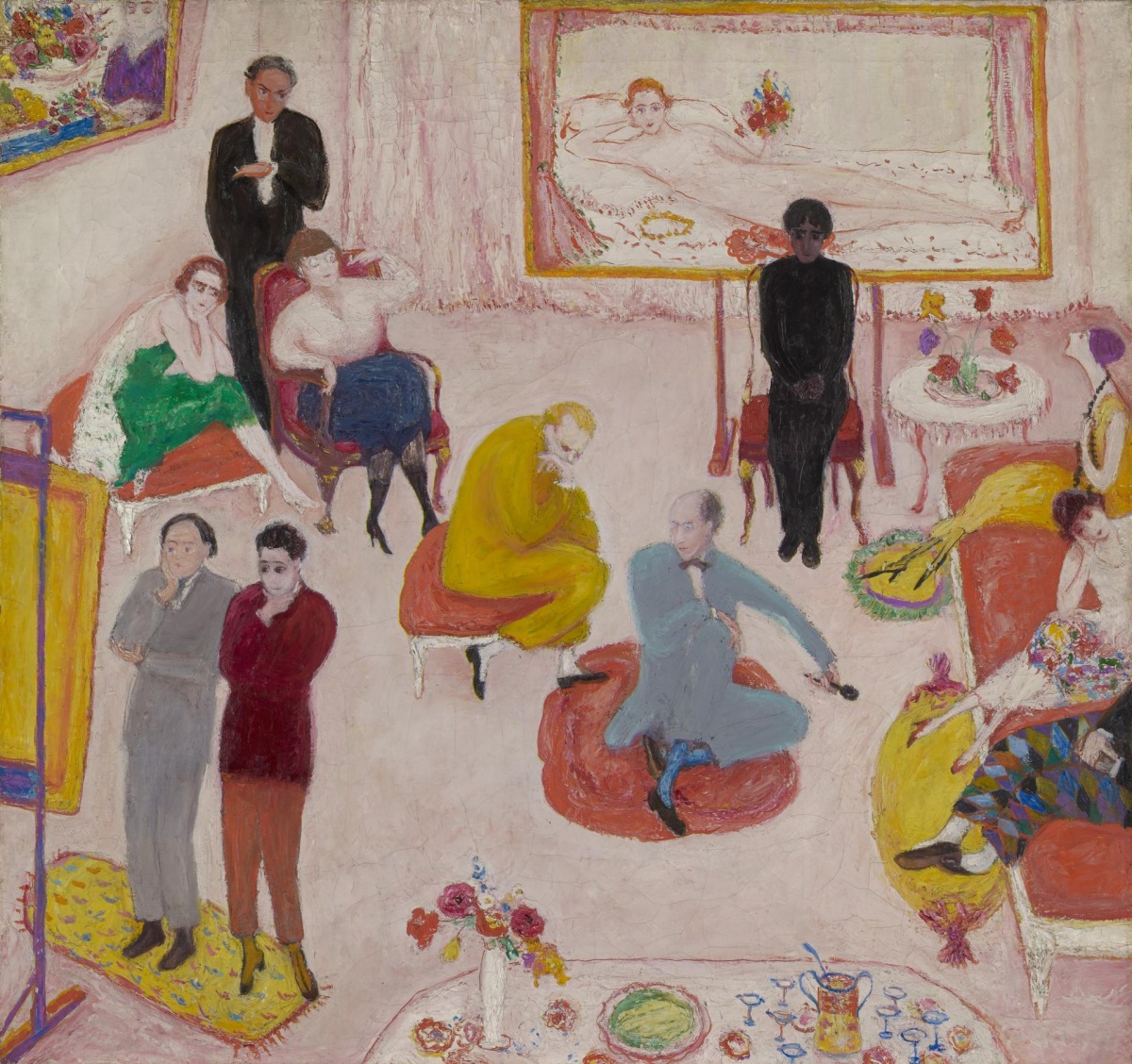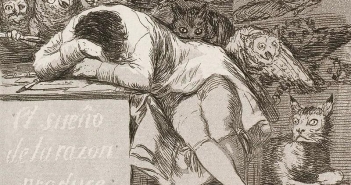In Ireland, North and South, the Arts Sector, currently, is a sinecure. Those middle-class mentalities which dominate, and, indeed, hold most high profile positions, would argue vehemently against such – as they would see it – an offensive statement, but nevertheless I believe it to be a fair characterisation.
‘Stephen says bitterly, “It is the symbol of Irish Art. The cracked lookingglass of the servant.” This was Stephen Dedalus’s view in Joyce’s modernist magnum opus, Ulysses, and we find this idiom pre-settling into an ‘independent’ Republic as a statement on colonial subjugation, and a lack of confidence in the national character. And since that imperial rule withdrew, neoliberal, self-serving attitudes, have moved – and settled – in as they have done across the Western World.
With the arrival of mass market production, relentless advertising and consumerism, which took over Irish sensibilities around twenty years ago, Ireland became no different to elsewhere.
Up to €7 for a pint of ‘Stout’ in Temple Bar?! Dublin rents going through the roof, past the cloud-clapped ivory towers and beyond into the dazzling astral heights, for pure unadulterated profit. This is an Ireland I do not care to recognise anymore. Everything, including morality, is up for sale.
With the internet, one can purchase the ‘lookingglass’ and have it in your hand the next day if one so wishes; but it will, inevitably, end up being tossed away, into landfill, soon thereafter. We live in ephemeral ‘throwaway’ times. Qualities like validity, truth and morality are diminished – and indeed ‘blend’ into ‘fiction-meets-truth’ in an Orwellian-era of ‘fake news’, outright lies and endless spin.
Ireland enjoys intellects but only if they are not overtly clever, and don’t create a sense of inferiority. Does the cracked lookingglass serve as a basis for the national character or identity?
Neil Burns takes issue with the 'artsy sentimentality' of those objecting to James Joyce's 'Dead House' on Usher's Island being converted into a hostel.https://t.co/d3HPHAckUe@Andrea_Rey48 @FintanOHiggins @CSBlenner @broadsheet_ie @CllrEoinOBroin @wadeinthewate11 @IlsaCarter1
— CassandraVoices (@VoicesCassandra) November 6, 2020
Indoctrination and Subjugation
A deep resonance of shame bubbles up from oppressiveness, whether it is indoctrination through the Catholic Church and a State which could not separate the two; and, in the wake of centuries of Viking, Norman, and indeed Anglo-Saxon, subjugation a deep hurt has not even been addressed. The need for a healing process in the collective psyche has not been considered by the remote heads of the post-modernist, mildly liberal, and increasingly secularised state.
Ireland was banished, but she was not razed and buried; she would return. And return she did onto her fertile isle, on the edge of Western Europe – the land of milk and honey, so rich in potential and verdant imagination.
It is true: I am in love with Ireland as landscape; and the mythical potency brings to mind an unconforming otherness – which espouses freedoms that rouse the romantic variant in a wanderer.
There is, however, now the prescient, palpitating and unresolved issue of the published writer: the ego, which conflates on the surface area of their proposed brilliance, leading to the belief that they, and their literary output, rival, and even surpasses the authors of literary Classics. In effect, canonising their own brand – this is where we are.
Let me add, that the Western World’s Canonical Works are up there for a reason, they are regarded as ‘the Classics’ and should be read and championed as such. A ‘Classic’ can be considered a strongly composed noteworthy book.
Among the writers who are generally considered the most important in Western literature are: Homer, Aeschylus, Euripides, Virgil, Horace, Geoffrey Chaucer, Dante Alighieri, William Shakespeare, François Rabelais, Jean Racine, Molière, Miguel de Cervantes, Michel de Montaigne, John Milton, Samuel Johnson, Johann Wolfgang von Goethe, William Wordsworth, Jane Austen, Stendhal, Walt Whitman, Gustave Flaubert, Emily Dickinson, Honoré de Balzac, Charles Dickens, Herman Melville, George Eliot, Leo Tolstoy, Henrik Ibsen, Sigmund Freud, Fyodor Dostoyevsky, Marcel Proust, Thomas Mann, James Joyce, Virginia Woolf, Franz Kafka, William Faulkner, Jorge Luis Borges, Pablo Neruda, Albert Camus and Samuel Beckett.
On #Bloomsday2021, Neil Burns inquires whether serious, attentive reading means anything anymore in an era of Mediocrity Inc., and hails the significance of the Outsider Novel.https://t.co/t8alzlMJU5@broadsheet_ie @foreverantrim @mrkocnnll @IlsaCarter1 @wadeinthewate11
— CassandraVoices (@VoicesCassandra) June 16, 2021
First Usage
The first writer to use the term ‘classic’ was Aulus Gellius, a second century AD Roman writer who, in the miscellany Noctes Atticae (19, 8, 15), refers to a writer as a classicus scriptor, non proletarius (‘A distinguished, not a commonplace writer’). Such classification began with the Greeks’ ranking their cultural works, with the word canon (‘carpenter’s rule’).
Moreover, early Christian Church Fathers used canon to rank the authoritative texts of the New Testament, preserving them, given the expense of vellum and papyrus and mechanical book reproduction. Thus, being placed in a canon ensured a book’s preservation as the best way to retain information about a civilization.
Contemporarily, the Western canon defines the best of Western culture. In the ancient world, at the Alexandrian Library, scholars coined the Greek term Hoi enkrithentes (‘the admitted’, ‘the included’) to identify the writers in the canon.
If you are a writer with a couple of books in print, and if you deride these works because you are so high upon your stamping, nose-blustering, mighty charger, due to being published, I am sorry, but this is out-and-out naïveté. It is emotional, inferior narcissism and ego-led savagery and in its way, denigrates the reputations of great writers of the past and their output.
Recently, reading an interview in which a writer stated that they did not, or could not, raise a little interest towards Jack Kerouac’s Beat Classic, On the Road, equating the experience with hitting one’s head ‘with a plastic spoon.’ – a petulant and unworthy response.
Infantilised Youth Culture
Infantilization of culturally accepted ‘norms’ through Happy Meals’ language, ‘LOLs’, and other solipsistic accepted ‘bant’ has led us down this cul-de-sac. Snowflake is used as a pejorative term. Other ‘trendy’ Smartphone-induced abbreviated terms such as ‘Merch’ and ‘Bae’: are now the common argot of an infantilised youth culture that permeates mainstream discourse.
Any perceived ‘criticism’ of these so called ‘established writers’ i.e., a writer who has a recent published book on the shelves, is meted out with condemnations and calls the gallows! In this solidarity, an insidious, irrational, emotionally-charged cabal is missing the point.
The media in Ireland love to promote long established writers and their works, but they routinely forget the Garret-based writers who slog bravely away by a figurative candle over their ‘Art’.
Please, fellow scribes, do not ‘Drown’ your ‘book’ like Prospero. Do not become disheartened because you are not alone. Your magic is your own and do not let it die because of the success of mediocre fare, which publishing houses choose to release.
Irish publishers, like UK publishers, and American publishers, are greedy for a quick return on profit and this mantra only serves their deity, the golden calf of money. Forget this wide-eyed, commandeering for a few hedonisms, and continue on.
Yeatsian Revival
Simply because Ireland has a vibrant literary-cultural inheritance – which came to the fore especially during the Yeatsian Irish Literary Revival from the turn of the twentieth century – should not, ergo, give prominence to literary reputations simply on the assumption they are part of a great tradition. Extreme reverence is the death-knell of strongly composed literature, which is kept in its primordial place for lack of oxygen, dragging itself off to the literary hinterlands, to peer through fissures of granite rock – redundant.
There are simply too many Creative Writing Courses being run in universities, which gladly take a student’s money – assuming they pay it up front and often – in order to place their ego on a pedestal; but the massive issue with this kind of fawning is that it misses the whole point of literature, which is to enjoy the simple immersive experience of reading something new, fresh, challenging that sets you upon the unknown territories of an adventure, knapsack in tow.
In Brian Friel’s Philadelphia, Here I Come, the main protagonist, ‘Gar’ Gareth O’Donnell, has a public and private self, played by two actors. The mimetic structures of the ego, in the Irish Literary Art’s Scene(s) do not allow for any logical critique – this kind of thought is placed in emotional narcissism, firmly rooted in insecurity: the public image of oneself in a position of power and the private self behind pulled chintz curtains. Seemingly, the paradoxical self is difficult for the Irish mentality to examine closely.
The Commentariat
Who are the Irish commentariat on which these assertions are based? One does not have to look too far: remember when Roddy Doyle, a decent Dublin novelist, took a few naïve swipes at Joyce’s masterpiece:
‘Ulysses could have done with a good editor,’ Doyle told a stunned audience in New York gathered to celebrate the great man who is credited with inventing the modern novel.
‘You know people are always putting Ulysses in the top ten books ever written but I doubt that any of those people were really moved by it.’
‘I only read three pages of Finnegans Wake and it was a tragic waste of time,’ he added. ‘Dubliners was Joyce’s best work, but Ulysses was undeserving of reverence.”
According to Richard Ellmann’s biography Joyce was once described as ‘A corner boy who spits in the Liffey.’ Jealously appears to lie behind denunciations such as Roddy Doyle’s.
"Heroin addicts tend to mate for life. Like dilapidated swans." Neil Burns (@foreverantrim) reflects on his work in an emergency accommodation in Dublin for nearly two years.https://t.co/F7TQAMFmRK @CllrEoinOBroin @broadsheet_ie @wallacemick @UnaMullally @wadeinthewate11
— CassandraVoices (@VoicesCassandra) September 29, 2020
Working Class Writers
The reality is that many aspiring Irish novelist are forced into work that prevents them from writing: no one doubts this, but many working class writers are living on the breadline; the cultural establishment response: ‘Ah, he’s grand’ desensitizes them to this struggle.
They may console themselves, ‘Sure, he was rejected thirty-seven times.’ Well, Robert M. Pirsig’s Zen and the Art of Motorcycle Maintenance was rejected over a hundred times – so statistics have little relevance, especially considering a lot of agents don’t know their furnished onions from their hot potatoes? The author of Moby Dick, Herman Melville, died in abject poverty. Those who seek justification in ‘statistics’ lack in the cold reasoning of logic.
The effete North – once a fertile ground for freedom of expression, and in around the harrowed fields of poetry, has been conquered by a small literary clique, who look out from their parapets, pouring scorn on anyone who dares to have the tenacity to write ‘good’ work – work which they see as threatening to their output.
A few diminutive literary-based, artsy, types run pop-ups and suchlike, now and again, as an alternative to the mainstream, but some, most, fall like a bright star into the slopping wetness of the Lagan, or the Foyle, only to have their inner-core frazzled and inevitably extinguished – another avenue burnt-out.
There will be those who will be quick to trot out, on horseback, with lances aloft, with ‘Ah, sure he has a chip on his shoulder,’ and other negative, quick-to-judge, comments. My riposte to this is: yes, I do have a chip, or rather the plural, ‘chips’, one on each shoulder, which helps balance me out. They will use the term ‘bitterness’, but ‘frustration’ is more apt. Ingratitude will be another conceited proclamation.
Also, the Halo-Effect: this being the over-promotion of well-established writers, with no love left for the outsider, unknown writer. Ireland’s cultural media embargo on new and fresh writing is wan to say the least; anytime an important event comes along they wheel out figureheads. Michael Longley’s poem, ‘Ceasefire’ is often wheeled out upon a gurney; again to be speculated upon; again in times of conflict; but I can safely say Ulster Unionism, which Longley would identify himself with, would never get down upon their knees to kiss anyone’s hand except their aristocratic, they believe, betters.
Ireland’s media has an infatuation with their well-established poets – poets who have been hanging around for thirty years – waiting for them to come on stage to deliver homilies of breathy, dramatic words. A false panacea for ongoing violent times.
The cult of literary reverence and priesthood in the Irish poetry scene is archaic, embarrassing, and non-progressive, and equates to the mystical sorcery in a Harry Potter inspired world of fakery. The ‘everyone wants to be famous’ and well-regarded, and thought highly of as a ‘writer’ is a trope which has simply gone too far.
It is fine to have dreams and aspirations, but one has to put the hard work, through falling, in failure, by rejection, after derision, and in managing jealousy. One only has to look at the work which is coming out of university produced magazines to see this. Recently, I read a short story in an Irish newspaper, online edition, and I despaired. What I see is diaphanous clichéd fare time and time again.
After mooching around town Lev finds a hostelry with a dizzying array of rules. Kafka’s Café is new fiction set in Dublin by Neil Burns evocative of our times.https://t.co/nfaTgp1OGV@foreverantrim @broadsheet_ie @wadeinthewate11 @IlsaCarter1 @Andrea_Rey48 @ggrace1984 #fiction
— CassandraVoices (@VoicesCassandra) February 19, 2021
Given Up
Not so long ago, I conversed with a very fine, and clever, female Irish poet who is not well known in Ireland. She told me that she has given up trying to have her work published in any Irish Arts-led magazines as her work is continually rejected.
I have read her work, it is good, and all that I can summarise is that some of these Arts folk do not know what they are doing, but, or rather, what they really are doing is selecting the work of their chums and, indeed, the work of themselves, for publication.
These are magazines which are supposed to have a fair-handed, even democratic, selection process for work which is submitted from the four tent-pegged corners of the island of Ireland. Nepotism is rife in the Irish Arts scene. If you are a friend of a friend, nudge-nudge, wink-wink, then you are ‘A-Okay, pal…I will get you published,’ literary merit notwithstanding.
There are of course exceptions, with real talents. Colm Tóbín is up there with the alive Irish intelligentsia, as is John Banville, both are true novelists in the sense of sitting down to read, to learn, then to write their own work, in conformity with the traditional literary model, and they should be applauded for their due diligence. They have hauled long nets and reeled in empty lines for their patience and perseverance to their Art, to pay off in the end.
What is to be done?
Easy – read more books. Read the Classics. A good novel will lead you to a wood at dusk, whereupon you will find a finely woven thread of golden-silk, and, as night falls, slowly traverse the wood and feel, along with the golden-thread, a growing self-belief. That is the power of strong writing. Do not shy away from challenging yourself with any prejudicial assumptions around what a reading experience is, should, or could, be.




